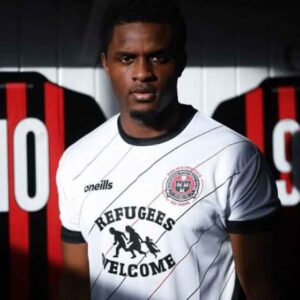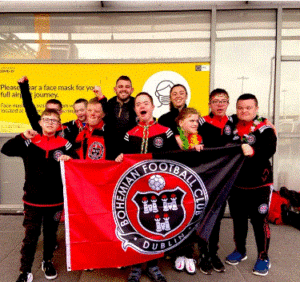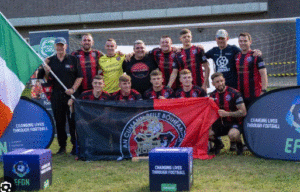Daniel Storey travels to Dublin to visit Bohs, the humanitarian football club that champions universal inclusion.
Bohemian FC, or Bohs to everyone who knows them, play their season-ending match this coming weekend. Ironically, this also marks the start of some of the busiest weeks of the year, when volunteers, staff, and players must band together to support one another.
It all began in 2018 when the club decided to provide a Christmas gift to every child living in the direct provision center—an enforced housing complex for asylum seekers—that was closest to the team’s Dalymount Park pitch.
When hundreds of individuals arrived to purchase gifts, they were unable to get enough children’s names. The next year, Bohs implemented the same plan for all Dublin’s direct provision kids, and all of a sudden, toys were stacked in the club bar and dressing rooms.
All impacted children in Ireland are now part of the Christmas present initiative. Bohs has to collect €100,000 (£87,100) and work in a convention facility where fans and players wrap presents. For a club of size, the logistics of getting 3,000 different people to buy presents just couldn’t work. However, starting next month, the club will deliver each and every gift to every corner of the nation.
It has a remarkable impact on folks with less resources. As a co-founder of the Movement of Asylum Seekers in Ireland (MASI), Lucky Khambule was once an asylum seeker in Ireland.
He has been involved in the struggle to discontinue direct provision with Bohs for a number of years; he understands the significance of Christmas presents and the wider impact of their work.
“How intimate is it when someone writes a tag and wraps a gift like it’s for their own kid?” Says Lucky. They might not understand how crucial that is. However, sharing love is what happens when someone does something voluntarily. Someone who might not normally smile is made to smile by a lovingly wrapped gift.
The Bohemians are justifiably proud of their origins, having been founded in 1890 as a membership cooperative that granted one vote to each member and forbade anyone from making money outside the club. They have never been demoted from the Irish Premier League. Their model of engaged citizenry was evident. They did not extract wealth. They had volunteer managers.
They were drifting, though. Almost all of the 400–550 persons that made up the Bohs’ membership fluctuated with time, and they were all there to watch the men’s team play. The team never really went beyond that; if they performed well, they were happy, and if not, they weren’t. It was very typical of its sport, and it was one-dimensional.
Bohs was on the verge of going out of business by 2011. They were almost conducting near reckless trading and were insolvent on their balance sheet. The lone hired worker at the club, Lynn, feared to answer the door or the phone. The team was forced to terminate player contracts, slash spending by 95%, and have board meetings where many in attendance believed they would be their last.
Two events took place. Initially, during an Extraordinary General Meeting, the members were asked if they thought it would be a good idea to telephone well-known Irish athletes or organisations and beg for financial support. They declined the suggestion. Some members would prefer that the club close its doors than compromise on the model and turn it over to investors in the private sector.
Second, the financial crisis made people reflect deeply. Bohs need assistance from the surrounding community since it needed more members and, consequently, it needed to become more integrated with the neighbourhood. Because it was the same ten years ago, will next year be the same as this one? Or may Bohs transform into someone else to claim the upcoming decades as their own? Chief operating officer Daniel Lambert, who joined the board in 2011, clarifies:
“We made the decision to investigate the following question: ‘How can we instill a feeling of pride in the club that extends beyond the team?'” And it became evident that all of them needed a place to call home. We live in an extremely diverse inner-city neighbourhood with both native-born people and immigrants, poverty and wealth, homelessness, global challenges, and a prison.
“They would stick with us if we, as a football club, reflected back the issues that these people face and assisted them in addressing them. There are far too many people in need, yet the club can serve as a channel for us to aid one another as a group.
And it succeeded. Since then, Bohs’ membership has increased by a factor of at least six, and because every Dalymount game is sold out, there is a waiting list. It was last summer when they went fully professional. A new stadium is being planned. They employ ten people permanently off the pitch. There are over fifty young teams, a women’s team, a team for amputees, disability teams, and a group for LGBTQ+ supporters.
The message that unites the vast majority of Bohs is that we are here to do good and cause no harm, whether in part, majoritively, or totally. They have two missions in life: football and humanitarian work, and they hope to succeed in both.

Bohs’ most well-known piece is arguably his work around the asylum system, and it’s not only for the holidays. They raise money for MASI’s work by selling their “Refugees Welcome” football shirt, which was released in collaboration with MASI and Amnesty International. Bohs have directly addressed the government, demanding an end to Ireland’s asylum system.
In order to fulfil the human rights charter’s requirement that children in the West Bank’s Tulkarem Refugee Camp have the “right to play,” they have collaborated with Sport for Life Palestine to generate funds for this purpose. From the earnings of the Bob Marley-themed shirt, they financed a music degree for a member of the refugee population, as it would not have been possible for them otherwise, at a cost of €12,000 (£10,450). They offer campaign groups facilities to work and host meetings.
Volunteers like Francis assist in supervising the transportation of asylum seekers, who are bused in from direct provision centres and given complimentary tickets for home games. Even though Francis is not Irish, he has witnessed the impact that going to games can have on people who may not have ever watched live sports and who have never felt a sense of belonging in a community like this in Ireland.
Francis states, “Bohemians has given life to many people.” I’ve learned that it’s a location where individuals from various nations, personalities, and languages coexist. We are happy that the club has been able to unite us in one space. When you visit this place, nothing else matters.
“As fans, we have aspirations to advance this club when we join. You want to help and you want others to go through the same thing for the first time. I’d be more than willing to help clean up the stadium and coordinate whatever that needs to be done after the game.
In an effort to foster integration between non-Irish children and those with Irish ancestry, Bohs also offers a free academy curriculum. They have even expanded this programme to include some of their partner clubs.
A few years ago, these kids migrated from Brazil to Ireland, and one of their coaches is Fernando. While searching the Fifa video game, he came across Bohs as a football team to support. He now spends his weekends assisting with children, ages five to seven. Countless others have told me that Bohs has simply become ingrained in their lives.
He remarks, “It’s just so good to see how much all these kids love football, even though they might never meet.” However, Bohs is solely responsible for making it happen. After receiving a jersey from me, my father in Brazil has become a fan as well. He often asks about the status and our next course of action whenever we speak.
When you spend time with Bohs members, you’ll find that one of the most fascinating things about the organisation is how its membership model has been used to generate a Rolodex of emotional engagement from professionals in a range of various fields, allowing them to scope their work around the local community. The reality is quite different from the initial temptation to view this as a “village fete” situation when someone shows up and is assigned a task.
Probably the best example is Seán McCabe. He advised the UN on climate action while working as a policy officer on climate justice at the Mary Robinson Foundation in Dublin. He knew Dan Lambert and attended Bohs matches. After a few years, McCabe was selected as the first Climate Justice Officer in world football, and Bohs have made climate action a key component of their approach. Three of their ten permanent non-football employees are dedicated to developing solutions for climate engagement.
This provides Bohs with the essential genuineness needed to win over a community and earn them more respect from the outside world. Seán has presented ideas for how the Eredivisie might approach the problem in the most effective way. In collaboration with the European Football For Development network, he is spearheading a project involving La Liga, FC Twente, Werder Bremen, and Ferencvaros. He has provided climate strategy assistance to the Golden State Warriors of the NBA. It is obvious that this piece encompasses far more than just Dalymount Park. Once more, Bohs are only the middleman.

McCabe is adamant that there are far too many incorrect perspectives in football. He uses the Eredivisie as an example, where the clubs generate about 97,000 tonnes of CO2 annually, or 0.05 percent of the country’s emissions. But in real life, about fifty percent is the responsibility of the Eredivisie team supporters. So, instead of unduly concentrating on how a club might lessen its own impact, they ought to be attempting to involve their community—local area, supporters—to comprehend the situation and provide them with the tools necessary to effect change.
Few cultural institutions have football’s global reach into every community on the earth, according to McCabe. “There is an urgent need to move on the climate crisis.” Prior to this, I had a lengthy career as a worker and a lifelong passion for football. People, in my opinion, recognise that there is a genuine chance that we may develop solutions that are worthwhile, beneficial to the community, and capable of spreading more quickly than other organisations.
Not that it’s simple. It is difficult to persuade people.
According to McCabe, clubs may become hesitant to interact with communities out of concern that they would be seen as hypocrites. It’s the biggest conundrum we might encounter: everyone requests a case study for a transition that has never been carried out previously. That, in my opinion, is partially due to the environmental movement’s unfortunate propensity for preaching and talking down. The majority of the recommendations are harsh: turn down the heat, take shorter showers.
We can devise plans that will slant the emissions curve, but they won’t endure long if they make life worse for those who already struggle. Those people will be demoralised by the change and will cast their votes for a candidate who promises to eliminate everything. We have all the proof we need over the past 10 years to know that voters would support candidates who deceive them into thinking they are on their side. So, long-term solutions must address the demands of a community, including safer streets, warmer homes, cleaner cities, and less expensive electricity.
The response, which is already starting to take on a theme, is engagement. People in your community will follow you down the road if they think you have their best interests in mind. The project management of a new facility that will function as a climate education centre and offer a new multipurpose area for the neighbourhood is being managed by McCabe’s colleague Kathlyne. The locals pitched in as usual to get it ready.
“A study conducted in collaboration with the European Football For Development Network revealed that football supporters have greater faith in their clubs than in politicians,” McCabe states. The way we utilise that trust is crucial in this situation. People can tell when we’re preaching, talking down, offering fake solutions, or telling them to do little things that will make their lives more difficult while big businesses pollute in vast quantities. Therefore, we need to be more astute, hold that trust in high regard, and use it to enhance the lives of those we interact with.
Universal inclusion is a key component of being a humanitarian football team. Your entire paradigm breaks down the moment you tacitly or explicitly exclude any member of your community. There isn’t an option. You should always be willing to help others and be an open door.
Just three minutes’ walk from the southeast corner of Dalymount Park, Mountjoy Prison welcomes visitors with an ominous grey archway and blue door, concealing some of the most significant work produced by the Bohs. Tommy Hynes, a community director and another member of that deeply attached Rolodex, is in charge of it. Prior to taking on this volunteer activity, Hynes had worked with heroin addicts in Dublin and the homeless in America.
As part of the project, a mini-league was organised within Mountjoy. To encourage more integration, the teams were frequently rotated amongst prisoners on different landings. There were talks about how important it is to integrate people via education and sport. Hynes and other volunteers discovered over time that participants in their effort who participated in sports had a significantly lower recidivism rate than the general population. Some of them persisted with the game after starting to play for neighbourhood clubs.
Other ideas were implemented, including a 5k Park Run within the prison to encourage exercise and create competition; comedy and entertainment shows; a sign language course that has proven to be very effective, according to Hynes; and an additional Christmas tradition wherein prisoners prepare dinner at the football club for the elderly members of the community. The most significant are the debates about community, sport, and education that take place in schools. It is considerably better to prevent than to cure.
“We were interested in finding out why people were avoiding crime,” explains volunteer Jeff Conway, a criminology master’s degree holder and Hynes’ nephew. The solution was clear: deep connections within the family and the community. taking part in neighbourhood gatherings and developing mutual trust. These people were raised in a disconnected environment and were disconnected from the start. All we did was show them various aspects of life. Though it may seem apparent, all they understood was how to live by doing what had to be done.
According to Hynes, “we sit everyone next to each other to talk at one of those Christmas dinners.” When the prisoner finally appeared, he expressed his sincere wish that the person he was sitting next to had not been the victim of theft. According to an elderly person, she would have most likely done the same thing if she had that boy’s life. This is when comprehension and empathy come into play.
Since those relationships serve as emotional bridges to the future, it is ideal for them to continue to have significance long after their physical presence has ended. I had a conversation with Michael [actual name withheld], a former prisoner assisted by the club in finding voluntary work upon his release. He’s now spent years taking teams into the prison to play and arranging games.
They start anticipating your arrival, thus you have an impact. About life outside, they enquire. However, you also want to make sure they’re doing well since they have an impact on you. I still see them around and they seem to be doing well even after five or six years. While some people may never escape that pattern, others will.
Leave a Reply